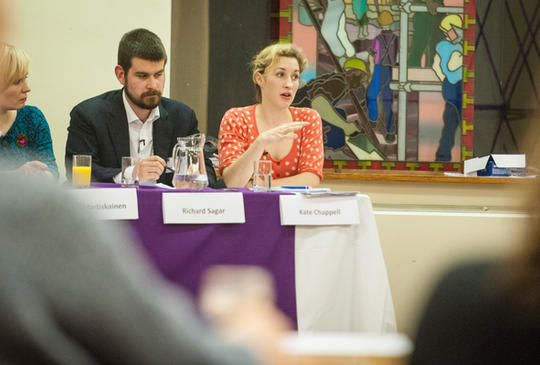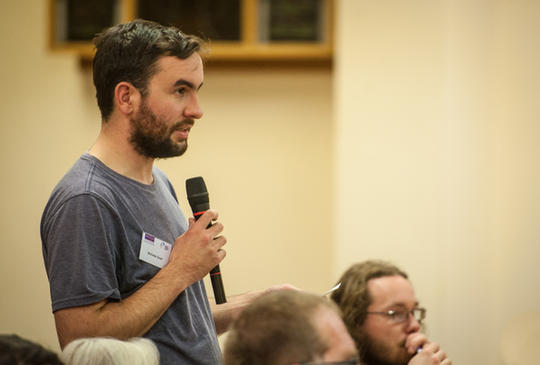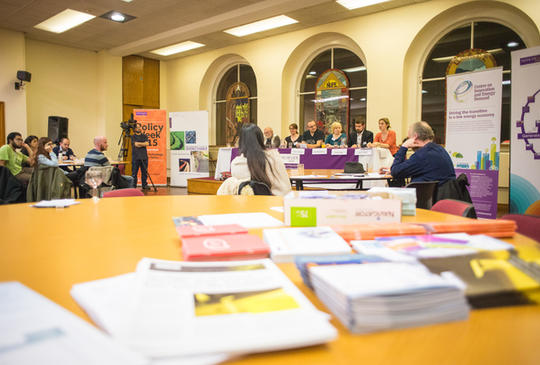
‘On the Home Front’: The challenges of domestic energy use reduction
‘On the Home Front’ brought together leading thinkers from the world of social science, policy and practice, with fellow academics, local activists and students, to discuss the lessons of UK domestic energy policies, how households can dramatically reduce their energy consumption and how the social sciences can inform this debate.
The event, hosted by the University of Manchester’s Sustainable Consumption Institute and the Centre on Innovation and Energy Demand, kicked off with an introduction by organiser Dr. Victoria Johnson to the concept of household energy demand reduction within the wider context of climate change.

The workshop attendees then split into groups to discuss a number of ‘provocations’ surrounding the issues in order to develop informed and insightful questions that would then be posed to a panel of experts later that evening.
Group discussion topics included: “Financial incentives are the only way to reduce household energy consumption”; “Should the government no longer have to subsidise solar photovoltaics through the Feed-in-Tariff”; and “Was the government right to abandon the Zero Carbon Homes Standard?”.
My own group, tackling the latter of those topics, was made up of two third year undergraduates embarking on energy related dissertations, a postgraduate researcher working on sustainability in industrial systems, a member of Manchester’s Carbon Co-op with personal experience of home retrofitting and someone about to embark on building a passive house for retirement.

Lively discussion ensued, covering everything from the tension between behavioural change and background smart technologies, the effect of abandoning the Zero Carbon Standard on the mainstream and sustainability specialist construction industry, the UK housing crisis, and the marginal higher costs of zero carbon new builds in the context of inflated land prices.
After feeding back our group findings to the workshop as a whole, we carried on the conversation at a networking reception, surrounded by the historic stained glass windows of Manchester’s Mechanics Institute, the birthplace of the Trades Unions Congress in 1868, as well as the Co-operative Insurance Society and UMIST (University of Manchester Institute of Science & Technology).
Following the reception, ‘On the Home Front’ moved onto ‘Energy Question Time’, a panel discussion chaired by the Carbon Co-op’s Jonathon Atkinson.

The panel consisted of SCI Research Fellow Dr. Alison Browne, Richard Segar (Senior Policy and Projects Officer, ResPublica, and author of ‘After the Green Deal’ report), Councillor Kate Chappell of Manchester City Council (Executive Member for the Environment), architect Marianne Heaslip of Urbanism Environmental Design, Dr. Mari Martiskainen (Research Fellow at the CIED) and Ron Bailey, Head of Parliamentary Affairs, Sustainable Energy Association.
A wide ranging and informed debate followed, covering diverse topics including: Manchester City Council’s plans to establish a collective energy supply deal for local residents; the future of the solar installation industry; how the Sustainable Communities Bill might be used to leverage local supply deals from community energy generation projects; the social equity of the Feed in Tariff; and difficulties of engaging householders with energy efficiency programmes.
To learn more about the University of Manchester’s Sustainable Consumption Institute, visit their website.
Photography by Matt Wilkinson.
‘Powering Up North’: changing our communities’ energy future
Contributed by Krista Patrick
Contributor Profile
Dr. Daniel Welch is a Research Associate at the Sustainable Consumption Institute, University of Manchester, where he is currently researching the role of institutional actors in food waste prevention. He was previously with the Sustainable Practices Research Group, in a communications role and synthesising the policy implications of the SPRG’s research. His doctoral thesis, in Sociology, analysed the commercial field of sustainability communications.




